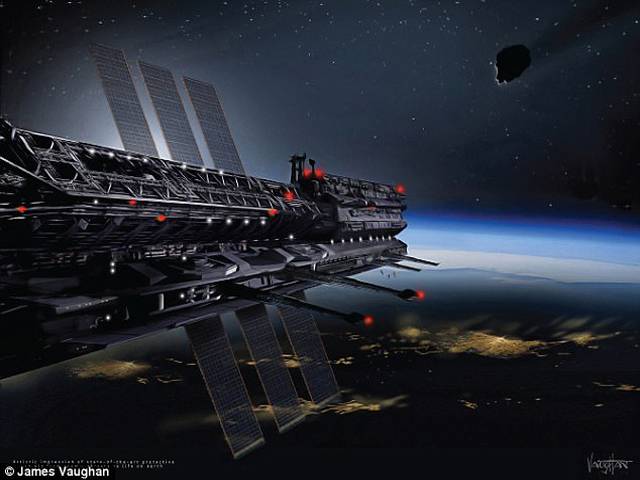LONDON-It might seem like an idea taken straight out of science fiction, but a ‘space nation’ could soon become a reality. The ambitious plans, first announced last year, were hatched by an international group of scientists and are backed by a Russian billionaire. The floating nation, dubbed ‘Asgardia’, is set to take its first step into space later this year with the launch of its maiden data satellite. The satellite will test the concept of long-term data storage in orbit around Earth.
It could pave the way for off-planet data and tax havens floating in space.
The launch represents the beginning of the team’s bizarre attempt to form an independent country outside of the legal and physical bounds of our planet.
The nano-satellite will piggy back on a re-supply trip to the ISS in September according to a recent US Federal Communications Commission (FCC) filing.
‘The primary payload is a solid state device hard drive,’ Asgardia said in the application.
‘The drive is loaded on the ground with data, and the data is updated once in orbit. ‘A file is returned that verifies successful data transmission.’
The nano-satellite will measure just 4 by 4 by 8 inches (10 by 10 by 20 cm) - roughly the size of a loaf of bread - and weigh about 5 pounds (2.3 kg).
It will come loaded with two particle detectors, mounted internally and externally, to test technologies that are key to the group’s goals.
‘From this data we can map the solar flux, and determine the radiation dosing that the internal electronics are receiving,’ the application said. The organisation is set to reveal further details about the satellite’s launch at a press event in Hong Kong on June 13.
The team, led by Dr Igor Ashurbeyli, billionaire and founder of the Aerospace International Research Center, unveiled the bizarre plans at a press conference in Paris last October.
Founder and chief financial backer Igor Ashurbeyli said at the time that he believed the space-bound private ‘country’ could ‘offer an independent platform free from the constraint of a land-based country’s laws.’
The project aims to create a new framework for ownership and nationhood in space by creating a completely new nation, according to the project leaders.
Alongside its announcement, Asgardia opened up applications for virtual citizenship via its website, and so far almost half a million people have pledged their allegiance. Asgardia promised citizenship to the first 100,000 who signed up, and said that those who do will not lose their Earth-bound nationality.
One of the early developments planned by the team will be the creation of a state-of-the-art protective shield for all humankind.
This will protect the world from cosmic threats, both man-made and natural, to life on earth.
This includes space debris, solar flares and asteroid collisions, the researchers say. ‘The project’s concept comprises three parts – philosophical, legal and scientific/technological,’ said Dr Ashurbeyli.
‘Asgardia is a fully-fledged and independent nation, and a future member of the United Nations - with all the attributes this status entails.’
There are estimated to be more than 20,000 traceable objects of man-made space junk, including old spacecraft, upper-stage rockets and final stage vehicles in near-Earth orbits. Natural objects in space also pose a threat to life on the planet.
For example. the impact of the Chelyabinsk meteorite which crashed over a major Russian town in 2013, injuring 1,100 people and damaging 4,000 buildings.
‘The essence of Asgardia is Peace in Space, and the prevention of Earth’s conflicts being transferred into space,’ Dr Ashurbeyli said.
The space nation, like the satellite set for launch this year, will remain at a low-Earth orbit. ‘As low-Earth orbit becomes more accessible, what’s often called the ‘democratisation’ of space, a pathway is opening up to new ideas and approaches from a rich diversity of participants,’ said Professor David Alexander, Director of the Rice Space Institute at Rice University, Houston, Texas.
‘The mission of Asgardia to create opportunities for broader access to space, enabling non-traditional space nations to realise their scientific aspirations is exciting.’






